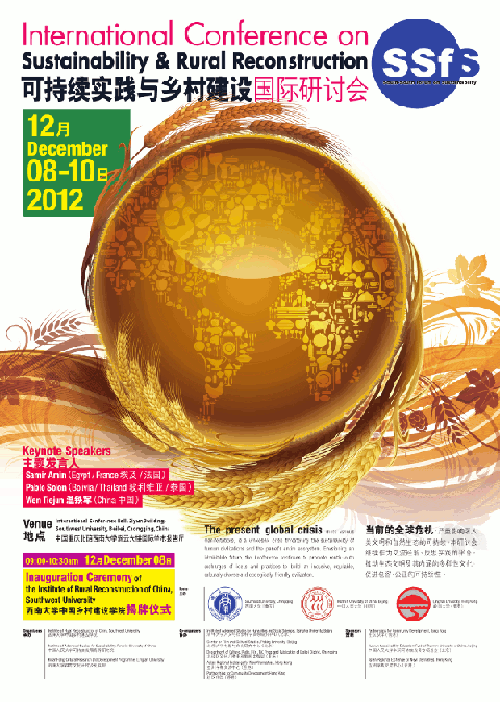Event Title
2012 International Conference on Sustainability & Rural Reconstruction
Start Date
9-12-2012 2:00 PM
End Date
9-12-2012 3:15 PM
Language
English
Description
In 1937, Rewi Alley, Edgar and Helen Foster Snow, and patriots in China initiated the Gung Ho Movement. They organized laid off workers and refugees displaced by the Japanese invasion to set up manufacturing cooperatives in aid of China’s resistance effort. This soon became a nation-wide civil movement of some 3,000 cooperatives.
To seek international support and promote the Gung Ho movement, Mme. Soong Ching Ling initiated the founding of the ICCIC - International Committee for the promotion of Chinese Industrial Cooperatives - in 1939, and was elected honorary chair. British Bishop of Hong Kong, R. D. Hall, was its chair. By the end of 1945, the ICCIC had raised some (USD) $10 Million in cash and materials from the United States, Britain, Canada, New Zealand, the Philippines, and Singapore-- gifts highly praised by senior leaders of the CPC, including Mao Zedong, Zhou Enlai and Ye Ting.
In 1952, the ICCIC ceased activities when its cooperatives were absorbed into the state system. After resuming activity in 1987, the ICCIC founded three cooperative pilot zones in Shandan (Gansu), Honghu (Hubei) and Longkou and Penglai (Shandong), and a number of village-level industrial cooperatives in over 20 cities and counties. Since then, the ICCIC has learned much about the roles cooperative enterprise can play in the economic and social development of China's diverse society. Lessons learned along the way have sharpened the ICCIC's co-operative development tools and approaches.
Today, ICCIC continues to help equip citizens, leaders, educators and policy makers to form cooperative enterprises that provide members with the financial and social benefits they need.
中国工合国际委员会,简称工合国际(ICCIC),是中国现存历史最悠久的全国性社会组织和国际性社团组织。当年为支援中国人民抗日战争,争取海外援助,促进中国工业生产合作社运动(简称工合运动),宋庆龄与国际友人1939年1月在香港发起成立中国工合国际委员会。1952年因全国合作总社成立等原因,工合国际停止活动。1987年为配合国家改革开放发展战略而恢复。经国家民政部注册登记为全国性社团法人,主管部门系中国人民对外友好协会。
工合国际恢复活动后主要从事促进合作社发展、扶贫、妇女培训、生态环境、灾后重建等社会公益事业,注重合作社的理论学术研究,参与《中华人民共和国农民专业合作社法》的研究起草过程。通过合作社实现经济与社会公平,缩小贫富差距,建设和谐社会。工合国际制定了有明确认同国际准则的中国合作社发展战略。工合国际还与其伙伴加拿大合作社协会(CCA) 共同研发了一个评估合作社的DLA(发展阶梯评估)工具。
工合国际是ICA(国际合作社联盟)和CICOPA (国际工业、手工业及生产服务者合作社组织)等国际组织的成员单位。
2012年工合国际第一次执委会决定,工合国际将继续发挥其国际性、国内外合作、城乡共同体的属性,把基本职能确定为五服务,即:服务于城乡合作社、服务于城乡合作经济、服务于民间外交事业、服务于国内外合作事业、服务于社会公益事业。
工合国际理念:努力干,一起干。
工合国际精神:团结、合作、勇敢、开拓。
工合国际基本职能:服务于城乡合作社、服务于城乡合作经济、服务于民间外交事业、服务于国内外合作事业、服务于社会公益事业。
Document Type
Conference
Chinese Version_Abstract supplement
Recommended Citation
Crook, M. (2012, December). ICCIC / Gung Ho: Helping to promote Chinese cooperatives. Paper presented at 2012 International Conference on Sustainability & Rural Reconstruction, Southwest University, Chongqingng, China.
Included in
Demography, Population, and Ecology Commons, Growth and Development Commons, Other International and Area Studies Commons, Place and Environment Commons, Sociology of Culture Commons
ICCIC / Gung Ho : helping to promote Chinese cooperatives = 工合国际促进中国合作社的发展
In 1937, Rewi Alley, Edgar and Helen Foster Snow, and patriots in China initiated the Gung Ho Movement. They organized laid off workers and refugees displaced by the Japanese invasion to set up manufacturing cooperatives in aid of China’s resistance effort. This soon became a nation-wide civil movement of some 3,000 cooperatives.
To seek international support and promote the Gung Ho movement, Mme. Soong Ching Ling initiated the founding of the ICCIC - International Committee for the promotion of Chinese Industrial Cooperatives - in 1939, and was elected honorary chair. British Bishop of Hong Kong, R. D. Hall, was its chair. By the end of 1945, the ICCIC had raised some (USD) $10 Million in cash and materials from the United States, Britain, Canada, New Zealand, the Philippines, and Singapore-- gifts highly praised by senior leaders of the CPC, including Mao Zedong, Zhou Enlai and Ye Ting.
In 1952, the ICCIC ceased activities when its cooperatives were absorbed into the state system. After resuming activity in 1987, the ICCIC founded three cooperative pilot zones in Shandan (Gansu), Honghu (Hubei) and Longkou and Penglai (Shandong), and a number of village-level industrial cooperatives in over 20 cities and counties. Since then, the ICCIC has learned much about the roles cooperative enterprise can play in the economic and social development of China's diverse society. Lessons learned along the way have sharpened the ICCIC's co-operative development tools and approaches.
Today, ICCIC continues to help equip citizens, leaders, educators and policy makers to form cooperative enterprises that provide members with the financial and social benefits they need.
中国工合国际委员会,简称工合国际(ICCIC),是中国现存历史最悠久的全国性社会组织和国际性社团组织。当年为支援中国人民抗日战争,争取海外援助,促进中国工业生产合作社运动(简称工合运动),宋庆龄与国际友人1939年1月在香港发起成立中国工合国际委员会。1952年因全国合作总社成立等原因,工合国际停止活动。1987年为配合国家改革开放发展战略而恢复。经国家民政部注册登记为全国性社团法人,主管部门系中国人民对外友好协会。
工合国际恢复活动后主要从事促进合作社发展、扶贫、妇女培训、生态环境、灾后重建等社会公益事业,注重合作社的理论学术研究,参与《中华人民共和国农民专业合作社法》的研究起草过程。通过合作社实现经济与社会公平,缩小贫富差距,建设和谐社会。工合国际制定了有明确认同国际准则的中国合作社发展战略。工合国际还与其伙伴加拿大合作社协会(CCA) 共同研发了一个评估合作社的DLA(发展阶梯评估)工具。
工合国际是ICA(国际合作社联盟)和CICOPA (国际工业、手工业及生产服务者合作社组织)等国际组织的成员单位。
2012年工合国际第一次执委会决定,工合国际将继续发挥其国际性、国内外合作、城乡共同体的属性,把基本职能确定为五服务,即:服务于城乡合作社、服务于城乡合作经济、服务于民间外交事业、服务于国内外合作事业、服务于社会公益事业。
工合国际理念:努力干,一起干。
工合国际精神:团结、合作、勇敢、开拓。
工合国际基本职能:服务于城乡合作社、服务于城乡合作经济、服务于民间外交事业、服务于国内外合作事业、服务于社会公益事业。
